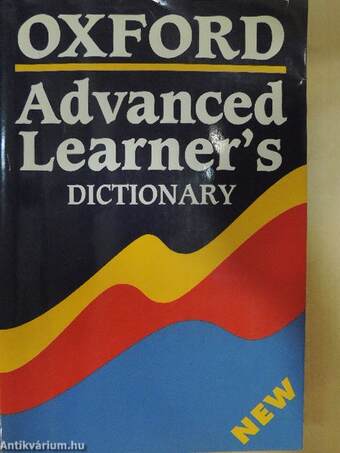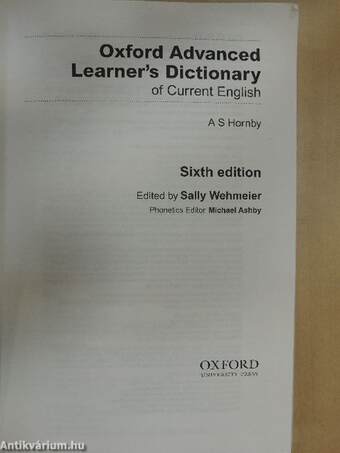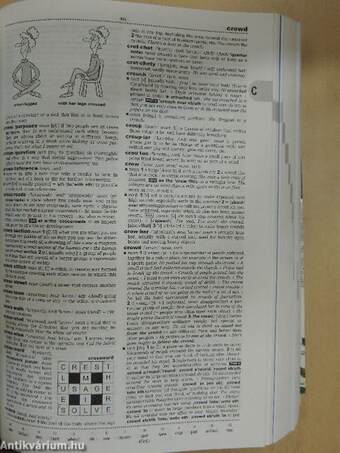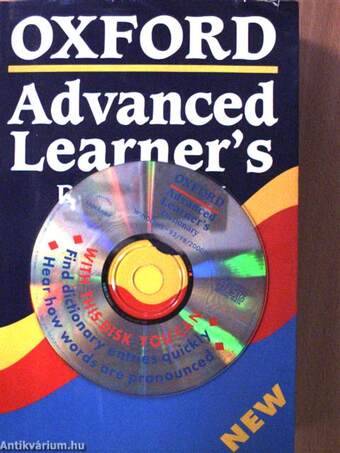1.068.097
kiadvánnyal nyújtjuk Magyarország legnagyobb antikvár könyv-kínálatát

VISSZA
A TETEJÉRE
JAVASLATOKÉszre-
vételek
Oxford Advanced Learner's Dictionary of Current English - CD-vel
| Kiadó: | Oxford University Press |
|---|---|
| Kiadás helye: | Oxford |
| Kiadás éve: | |
| Kötés típusa: | Varrott papírkötés |
| Oldalszám: | 1.539 oldal |
| Sorozatcím: | |
| Kötetszám: | |
| Nyelv: | Angol |
| Méret: | 23 cm x 16 cm |
| ISBN: | 0-19-431-564-9 |
| Megjegyzés: | CD-melléklettel. Színes és fekete-fehér illusztrációkkal. |
naponta értesítjük a beérkező friss
kiadványokról
naponta értesítjük a beérkező friss
kiadványokról
Előszó
Preface In 1998 we celebrated both the centenary of the birth of A S Hornby, the creator of the Advanced Learner's Dictionary and the fiftieth anniversary of the publication of the dictionary by... TovábbElőszó
Preface In 1998 we celebrated both the centenary of the birth of A S Hornby, the creator of the Advanced Learner's Dictionary and the fiftieth anniversary of the publication of the dictionary by Oxford University Press. Hornby's great contribution to lexicography was to apply his experience as a teacher of English to producing a dictionary that met the needs of learners, and his success can be measured by the fact that the Advanced Learner's has become one of the best-selling books of all time. Now, in the first year of the new millennium, this edition, the sixth, breaks new ground, sharpening further the learner-centred focus of the originál. We have learat a great deal from our research into how learners use dictionaries and benefited from suggestions from very many teachers and students. Dictionary users need to be able to find the information they need quickly, understand it once they have found it, and make use of it in their own speaking or writing. This dictionary arranges and presents information in a clear way, using short cuts in longer entries to help the user pinpoint the meaning they are looking for. The definitions are all written using a defining vocabulary of just under 3000 words, 500 fewer than in the previous edition. This defining vocabulary (listed on page 1531) includes all the items used in definitions and is not made artificially shorter by allowing prefixes and suffixes to be attached to the stem of a listed word. Learners can be sure that, if they are familiar with the words in this list, the definitions in the dictionary will pose no problems. Our new usage notes, word-family boxes, topic and study pages show links between vocabulary items and, together with the userfriendly help notes, give invaluable guidance on usage. The origin notes provide fascinating insights into the etymology of somé colourful words and expressions. AH these features ensure that less experienced learners receive all the support they need, while the most advanced will always find something new and mteresting to challenge them. I am very grateful to all those both within and outside Oxford University Press who have helped with the writing and production of this dictionary. For this edition Michael Ashby, the Phonetics Editor, has improved our representation of the pronunciation of American English. Susan Wilkin helped with the implementation of his policy. Keith Brown gave advice on aspects of the grammatical information shown in the dictionary, especially the verb coding system. The following worked as lexicographers: Evadne Adrián-Vallance, Ruth Blackmore, Michael Britton, Alexandra Clayton, Eunice Dalieres, Margaret Juli Costa, Michael Mayor, Kate Mohideen, Allene Tuck and Annié Watson. Rosalind Combley, Stella O'Shea and Laura Wedgeworth helped with the editing in the later stages of the project. Andrew Delahunty researched and wrote the usage notes. Lisa Isenman, Diane Pecorari and Ruth Urbom were American English editors. Fran Holdsworth was responsible for the exceptionally clear and elegant page design, and for the design of the topic and study pages. Christopher Howson designed the colour pages. In-house Sandra Pyne, Deborah Tempest and Miranda Steel worked on the dictionary in its early stages. Jane Taylor commissioned the illustrations. Our Publishing Systems Group kept the schedule on track and oversaw the capture and manipulation of data. Very many thanks are due to Anna Cotgreave, Bili Coumbe, Julié Darbyshire, Júlia Hiley, Kay Pepler, Katrina Ransom and, especially, Frank Keenan. I should like to express my gratitude for their hard work and commitment to Jo Florio and Dilys Parkinson and to my senior editor, Diana Lea. Jo developed the 'short cuts', Dilys was responsible for the help and usage notes and Diana gave invaluable input into all aspects of the dictionary, particularly the topic, study and illustrations pages. Moira Runcie was unstinting in her support throughout the project. I am indebted to her. Finally, I should like to acknowledge my debt to Jonathan Crowther, whose meticulous work on the fifth edition was an inspiration to me. Sally Wehmeier January 2000 VisszaTartalom
Preface viKey to the dictionary vii-x
Understanding definitions x-xi
Numbers and symbols xii
The Dictionary 1-1508
Topic pages
Computing 250-1
Cooking 274-5
Health 598-9
Musical instruments 840-1
Sport 1250-1
Colour illustrations
Bread, cakes and desserts A1
Fruit A2
Vegetables A3
Clothes and fabrics A4-5
The animal kingdom A6-7
Games and toys A8
Language study pages
Linking words together B2
Collocation B3
Nouns and adjectives B4-5
Verbs B6-9
Phrasal verbs B10-11
Idioms B12
Informál letters, faxes, memos and e-mails B13
Formai letters B14
Writing a CV or resumé B15
New words B16
Maps
The globe and the seasons C1
The world C2-3
The British Isles C4-5
Canada, the United States and the Caribbean C6-7
Australia and New Zealand C8
Appendices
1 Irregular verbs 1509
2 Geographical names 1512
3 Numbers 1517
4 Punctuation 1523
5 The language ofliterary criticism 1526
6 Notesonusage 1528
7 Defining vocabulary 1531
Inside front cover
Abbreviations, symbols and labels used in the dictionary
Key to verb patterns
Inside back cover
Pronunciation and phonetic symbols in the dictionary
Témakörök
- Idegennyelv > Idegennyelvű könyvek > Angol > Nyelvészet
- Idegennyelv > Idegennyelvű könyvek > Angol > Szótárak
- Nyelvészet > Idegen nyelvek > Tanulása
- Szótárak > Terjedelem szerint > Nagyszótár
- Szótárak > Szakszótárak > Gyakorlati > Diákszótár
- Szótárak > Idegennyelvű szótárak > Angol
- Idegennyelv > Nyelvtanulás > Nyelvek > Angol > Tanfolyamok > Felsőfok
- Idegennyelv > Nyelvtanulás > Nyelvek > Angol > Szótár
- Idegennyelv > Nyelvtanulás > Nyelvek > Angol > Hanganyaggal kiegészített tankönyvek
Megvásárolható példányok
Nincs megvásárolható példány
A könyv összes megrendelhető példánya elfogyott. Ha kívánja, előjegyezheti a könyvet, és amint a könyv egy újabb példánya elérhető lesz, értesítjük.









